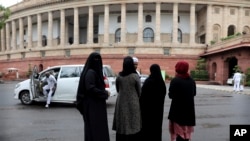India's parliament has passed a measure to criminalize the centuries-old practice of instant divorce among Muslims and punish men with jail terms if they defy a ban on what is known as "triple talaq."
The government said a law was necessary because there have been instances of Muslim men continuing to terminate marriages by repeating the Arabic word "talaq" three times, although the practice was outlawed by India's Supreme Court in 2017.
The bill sets a fine and a jail sentence of up to three years for men convicted of using the practice. It will become law as soon as the president signs it.
In a tweet, Prime Minister Narendra Modi said "an archaic and medieval practice has finally been confined to the dustbins of history," and it "corrects a historical wrong done to Muslim women."
The measure, called the Muslim Women Protection of Rights on Marriage Bill, was passed in the upper house of parliament amid protests from the main opposition Congress party, which opposed setting a prison term for offenders and wanted further scrutiny of the bill.
Critics of the law say it is a harsh measure that's open to misuse and is being used by the Hindu nationalist Bharatiya Janata Party to target Muslims.
Law Minister Ravi Shankar Prasad defended the bill, saying it was necessary to protect the dignity and honor of Muslim women and ensure gender justice.
The bill's passage is seen as a major victory for Modi's government, which failed to pass it during Modi's first term in office. The bill had been passed by the lower house last week, but all eyes were on Tuesday's vote because the government does not have a majority in the Upper House. It passed 99 to 84.
The practice of "triple talaq" has long been banned in several Muslim countries like Egypt, Bangladesh and Pakistan but continued in India.
Zakia Soman, a cofounder of the Bharatiya Muslim Mahila Andolan (BMMA) organization, which was at the forefront of the legal battle to scrap "triple talaq," welcomed passage of the bill. "It will not change our lives overnight, but it would give strength to the movement for justice for Muslim women," according to Soman. She said "it was a moment to rejoice."
Women rights activists had cited many cases where men had divorced women via letter, telephone and, increasingly, by text message, WhatsApp and Skype by uttering or writing the three words. They said what was practiced in India was a misinterpretation of Islamic law.
Conservative Muslim clerics, however, had staunchly opposed efforts to scrap "triple talaq," calling it a religious issue that should not be interfered with.
Although India's constitution guarantees equality, it allows matters such as marriage, divorce and alimony to be governed by religious laws.
Tahir Mahmood, an expert on Islamic law, said he hoped the law would act as a deterrent on Muslim men divorcing wives in an arbitrary manner. He said the practice should not have been made a criminal offense, but he pointed out that religious leaders of the community had failed to do anything to curb the practice.
Some scholars of Sharia law call "triple talaq" a travesty of divorce as envisaged in the Quran. They say the word has to be pronounced over three months and accompanied by efforts at reconciliation.





